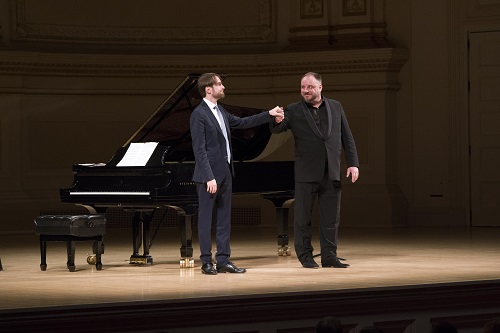 United States Various: Matthias Goerne (baritone), Daniil Trifonov (piano), Carnegie Hall, New York, 6.2.2018. (RP)
United States Various: Matthias Goerne (baritone), Daniil Trifonov (piano), Carnegie Hall, New York, 6.2.2018. (RP)

Berg – Vier Lieder Op.2
Schumann – Dichterliebe Op.48
Wolf – Drei Gedichte von Michelangelo
Shostakovich – Selections from Suite on Verses of Michelangelo Buonarroti Op.145: ‘Dante’, ‘Death’, ‘Night’
Brahms – Vier ernste Gesänge Op.121
It is hard to imagine two men more dissimilar than the German baritone Matthias Goerne and the Russian pianist Daniil Trifonov. The singer, well into middle age, lumbers on stage with a broad smile on his face. When singing, he seems possessed by the music, his broad, sweeping phrasings mirrored in the swaying of his body. Trifonov, just half his age, is in contrast lithe, unassuming and meticulous, carefully organizing his music before he began to play. Sitting ramrod straight, he impresses through the clarity and intensity of his playing. Theatricality is evidenced by a few dramatic arm movements and the flourish of his elegant hands. The inherent contrasts coalesced, however, to create an exquisite frisson of musical expression.
It was a dark program that began and ended with songs of death. Berg’s first published songs commence with the anticipation of sleep when the fullness of life subsides into eternal rest. Brahms’ final cycle begins with the realization that the human condition is no better than that of animals, for both ultimately die. It ends, though, with a benediction: ‘Now abideth faith, hope, charity; but the greatest of these is charity’. For Brahms, it was a hard-won peace.
Schumann’s Dichterliebe offered only intermittent moments of respite from the gloom. The first song, ‘Im wunderschönen Monat Mai’, was uncharacteristically slow and rueful, while ‘Die Rose, die Lilie, die Taube, die Sonne’ was performed at a breakneck tempo. After a rock-like ’Im Rhein, im heiligen Strome’, Goerne lashed out with unrestrained vehemence in ‘Ich grolle nicht’. There were intermittent bursts of joy in ‘Ein Jüngling liebt ein Mädchen’ and ‘Aus alten Märchen’, but heartbreak and rage were the prevailing emotions.
As with the Brahms, the Wolf and Shostakovich songs were composed for the bass voice. Wolf finished his three Michelangelo songs only six months before his death at the age of 42. His demise mirrors that of Schumann; both men suffered from syphilis and died in an insane asylum after attempting suicide. The three Wolf Lieder are actually love songs, albeit the joy is interspersed with pain and suffering.
Shostakovich’s setting of 11 poems by Michelangelo was composed shortly before his death in 1975. In the composer’s own words, the subject of the songs was ‘wisdom, love, creation, death, immortality’. The titles speak for themselves, ‘Death’ and ‘Night’, with the latter expressing the sentiment, ‘I love sleeping, but love being stone even more’. However, the first of the three, ‘Dante’, proclaims there is no more glorious fate than that of the immortality afforded the great poet.
Goerne is in prime vocal state, the beauty of his voice increasing with the years. His low notes now sound with a spacious richness, while the high notes blaze like the burnished blast of a horn. (He understandably did not sing the alternative high notes in ‘Ich grolle nicht’, but I still longed to hear him do so.) His phrasing and legato are amazing, especially when he carries the full weight of that glorious column of sound to soaring climaxes. Then there is his fine sotto voce, which he employs sparingly to great effect. He has his idiosyncrasies, but what a singer he is.
If I was awed by Goerne, I was simply staggered by Trifonov’s playing, perhaps no more so than in the Schumann. I have heard these songs countless times, but have never experienced the wealth of detail and breadth of emotion that Trifonov brought to the piano parts. Perhaps it was the difference in the two performers’ approaches that made it so. The postludes after ‘Im Rhein, im heiligen Strome’ and ‘Am leuchtenden Sommermorgen’ were revelations, while the final one of ‘Die alten, bösen Lieder’ was spellbinding.
As might be expected, the Shostakovich accompaniments were particularly vivid, although his coloring of Wolf’s dark chromaticism was captivating. Throughout, Trifonov not only accompanied Goerne, but conversed with him as his musical partner.
The trajectory of the program was intended to be a seamless arc from the spare, crystalline opening notes of the Berg’s songs to the benediction of the final Brahms’ chords. Through sheer determination, Goerne and Trifonov almost succeeded. But never underestimate the will or obliviousness of certain members of an audience.
I thought that an encore was not in the offing, but I was wrong. ‘Bist du bei mir’, the simple, moving melody that Bach transcribed for his second wife, Anna Magdalena, was perfection. I couldn’t help but think that Goerne was rather proud of himself for coming up with that one, as well he should be.
Rick Perdian